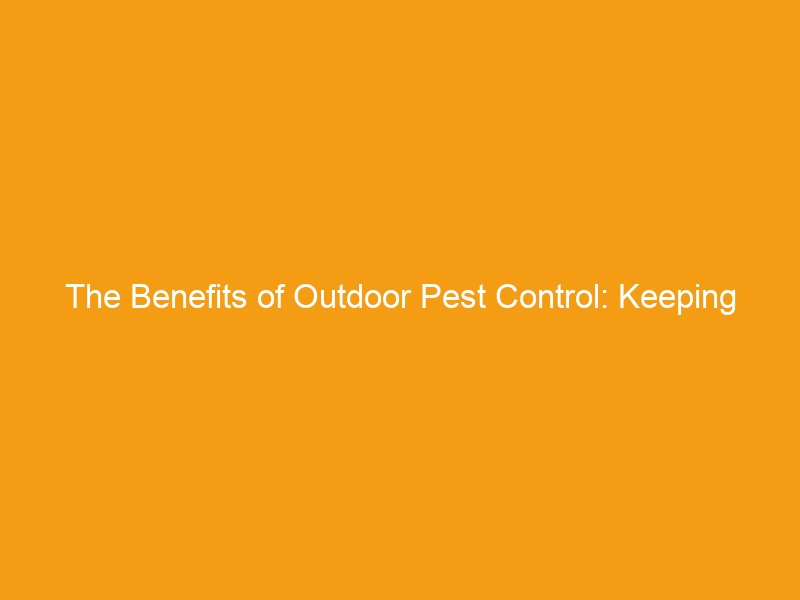Introduction to Outdoor Pest Control
Managing pests outside is not only a task that needs to be done seasonally; it is essential to maintaining a safe and enjoyable home and garden space. Individuals looking to implement successful strategies are advised to seek help from a professional pest control near me. Finding a happy medium between effective pest management and environmental conservation is crucial. Outdoor pest management protects your garden and plays a vital role in safeguarding your home against potential pest infestations.
The Importance of a Pest-Free Outdoor Space
Having a yard free from pests is essential, as it provides a safe environment for family activities, pets, and gardening. Outdoor pest control helps manage pests such as mosquitoes, ticks, and termites, which can carry diseases and cause significant damage to plants and property. Maintaining a pest-free space is crucial for health and safety, adding another layer of comfort and security to your home life. For example, mosquitoes are known to transmit dangerous viruses, and ticks are notorious for spreading Lyme disease.
Common Outdoor Pests and Their Impact
- Mosquitoes: Known for their itchy bites, mosquitoes can also spread diseases like West Nile and Zika. These insects breed in stagnant water, so eliminating any standing water around your home is essential. Effective mosquito control can significantly reduce the risk of these diseases.
- Ticks: These pests can spread Lyme disease and other severe sicknesses. They do well in tall grass and forests and need consistent yard upkeep to control their numbers. They wore protective clothing and applied tick repellents outside, which can also reduce the risk of tick bites.
- Aphids: These minor bugs consume plants and can harm gardens extensively. Aphids can damage plants by extracting their sap, resulting in inhibited growth and decreased harvests. Utilizing successful methods in pest control, such as introducing helpful insects like ladybugs, can effectively manage aphid populations.
- Termites: While often associated with house damage, termites can also cause havoc in outdoor wooden structures. These pests feed on wood, compromising the integrity of your yard’s fences, decks, and other wooden elements. Regular inspections and preventive treatments can help protect your property from termite damage.
Methods of Outdoor Pest Control
There are several effective methods for outdoor pest control, ranging from natural solutions to chemical treatments. Let’s explore some of these methods:
- Biological Control: Involves using natural predators or parasites to manage pest populations. For instance, ladybugs can help control aphid populations. Introducing beneficial insects to your garden can create a balanced ecosystem where pests are kept in check naturally. Additionally, birds and bats can serve as natural pest controllers by feeding on insects.
- Chemical Control: Although efficient, this approach should only be utilized occasionally and with caution to reduce harm to the environment. Always adhere to the instructions on the label when using pesticides and opt for products that focus on certain pests while preserving beneficial organisms. IPM strategies frequently blend chemical Control with alternative techniques for a well-rounded approach.
- Physical Barriers: Fences, nets, or traps can prevent pests from accessing certain areas. For example, netting can protect fruit trees from birds, while fences can keep larger animals like deer out of your garden. Traps can also be effective for capturing specific pests like rodents and insects.
Benefits of Professional Pest Control Services
While DIY methods can be effective, professional pest control services offer several advantages:
- Skillset: Professionals possess the expertise to diagnose and manage pest issues accurately. They can evaluate how severe an infestation is and suggest the most suitable treatment options. This knowledge guarantees that pests are efficiently managed without causing damage to the environment.
- Efficiency: They can produce faster and more effective results. Pest control experts can access specific tools and chemicals that regular people lack. Their skill level allows them to quickly and efficiently address pest issues, saving you time and effort.
- Long-term Solutions: Experts consistently offer long-term maintenance plans to ensure a pest-free environment. Regularly checking and treating can prevent future invasions and protect your household and yard. This proactive approach can help avoid costly harm and health risks associated with pests.
Best Practices for Maintaining a Pest-Free Outdoor Space
Adopting good practices can significantly reduce pest presence:
- Routine Maintenance: Clear debris and standing water to prevent pest breeding grounds. Maintaining a clean and organized yard can remove possible places for pests to hide and reproduce. Consistently cutting the grass, pruning shrubs, and removing fallen leaves can deter pests from your outdoor area.
- Taking good care of plants: Strong plants are less likely to be affected by pests. Offering sufficient water, nutrients, and sunlight can assist plants in flourishing and defending against pest harm. Trimming back and eliminating unhealthy or infected plants can also stop the transmission of pests and diseases in your garden.
- Periodic examinations: Consistent inspections can help detect and manage pest problems sooner. Frequently checking your yard and garden can detect pest issues before they worsen. Search for indications of pest activity, like bitten leaves, gaps in the ground, or impaired wood. Intervening early can stop infestations from spreading and causing further damage.
Staying informed about effective pest control methods and integrating them into your routine can make a significant difference. Understanding and implementing integrated pest management practices is critical to balancing efficacy and sustainability. Combining different pest control methods and considering the long-term effects can create a healthier and more resilient outdoor environment.
Conclusion
Outdoor pest control is crucial in maintaining a safe and enjoyable living environment. By understanding the different methods and their impacts and incorporating environmentally friendly practices and professional services, you can keep your garden and home free from pests. Prioritizing pest control can enhance your quality of life, protect your property, and contribute to a healthier ecosystem for everyone to enjoy. Remember, a little preventive effort goes a long way in ensuring a pest-free outdoor space.

